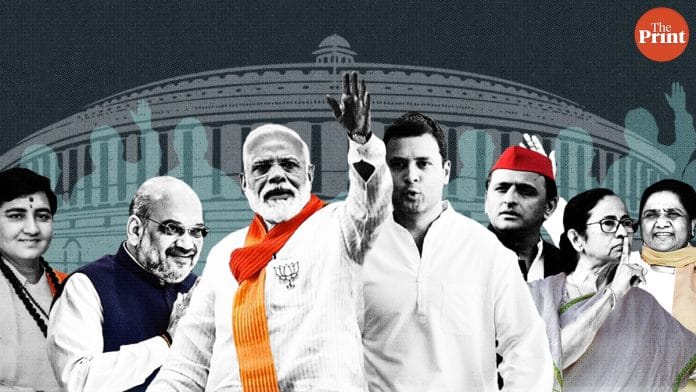Thank you dear subscribers, we are overwhelmed with your response.
Your Turn is a unique section from ThePrint featuring points of view from its subscribers. If you are a subscriber, have a point of view, please send it to us. If not, do subscribe here: https://englishdev.theprint.in/subscribe/
Indian political space is a maze of contradictions where one can get lost forever. A clear picture can be seen while observing the space dispassionately without preconceived ideas.
An overview of the political parties and proposed alliances.
Here is a brief on all important political parties in India and their voter bases: BJP (religion), Shiv sena (religion, dynasty), INC (Muslims(religion), dynasty), Muslim Leagues(religion), Akali (religion), SP (clan, dynasty), BSP (Dalits), DMK, AIDMK (Dravidian Identity, parochial.), – JD(U), YSR Congress, TMC, Biju JD, are all parochial. AAP is a relatively new party and the Left as an ideology is almost extinct in India. Only a couple of parties from these have a national identity, so essential to grow, develop and be counted in the elite Nations of the world.
All parties are obviously pursing diverse politics by cozying up to their respective voter bases. None of these parties are really “secular” unless “secular” refers to only wooing Muslims. So, secularism falls flat on its face even before Indian politics is discussed. Gaining and staying in power is the ultimate aim of all political dispositions. Except for two, the BJP and INC, no party can boast of a real national presence. While regional parties come to power in the federal states with a parochial agenda, it has always been a worry for India in the past few decades as to who will rule at the Centre.
In the context of these political dynamics, the issue of caste has resurfaced as a significant factor influencing electoral strategies and party alignments. The interplay between caste and politics continues to shape the landscape of Indian democracy.
Finally, a couple of decades back the BJP came up to form a government on its own at the center displacing INC as a major player. INC still remains the only single challenger to power at the Centre. Buit it is floundering – we are not here going into the reasons. In the event, important political parties are attempting to form a coalition and fight the BJP together. A viable thought in our diverse democracy.
It is obvious, no one party in the alliance will want another party to dominate. Also, a realization has dawned on the regional parties that hitching a ride with INC will weaken their chances in assembly constituencies. Moreover, the coalition is not a result of confluence of ideas as it is an alliance to defeat BJP, making it difficult for the group to form a workable and convincing post poll agenda for the nation. Another aspect of the artificial alliance is the hypocrisy shown by parties.
For instance, as political parties DMK is no different from BJP. DMK thrives on a platform of ethnic Dravidian identity while the BJP is rejuvenating the Bhartiya identity; both are perceived to have alienated a part of their respective electorate – DMK the upper castes (and wooing Muslims) and the BJP the Muslims (and wooing upper castes) Both recall from old literature; both are good administrators; both are keen on development, progress and delivery to the needy. It is an irony that while the coalition vilifies BJP for its ideology, that one of its constituents is no different. Also, While the INC is strong on paper, and still boasts of a pan India voter base, for various reasons, it has failed to convince the alliance to be accepted as the leader of the pack. With such contradictions, the coalition can never really take off.
National identity.
It is time we Indians, stopped fooling ourselves with this misplaced sense of secularism. Except pity, all other emotions including tolerance are a two-way traffic, unless as they say one wants to “play politics”. But then on the final count in India, as elsewhere in democracies, politics is a game ultimately played with people’s emotions. The Nation does not progress on emotions. The delivery of progress and development to the people is the only long-term sustaining factor. Yet in a diverse and very big democracy like India, the Nation has to have an emotive rallying point. initiated by a majority of likeminded people and carried by all citizens. A simplistic example is the way the nation is moved by cricket. For one of the only surviving ancient civilization like India, falling back on the still valued ideals and ideas of those times is in no way anti “secular”, if it can unite a nation with a bit of tolerance and understanding from the “minority”, so to speak.
Tailpiece: During the time of Ramayana, Ram or in the days of the composition of the great epics there were no Hindus in India but only Indians. Hinduism was not a religion (it is not, even now) but only a way of life of the locals. The Indian epics cover India from Afghanistan to Manipur and from Tibet to Sri Lanka. Ram is not an idol as much as a set of ideals and ideas as propounded in the epics. It is time for India and all Indians to move on and emerge from being a laggard democracy.
These pieces are being published as they have been received – they have not been edited/fact-checked by ThePrint.


